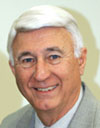By Ronald Kelly

I'm glad to be here with you today on this tenth celebration of our Hispanic Heritage in the Glendora church. It's a good thing to be doing and very enjoyable to see the music and the decorations that remind us that we are a multicultural church.
It wasn't always this way. For its first decade the Church of Jesus Christ was 100% Jewish.
The rapid growth that came on and after Pentecost was all Jewish. Then there came a few cracks in the facade. The deacon Philip went down to Samaria and apparently converted the whole city (Acts 8). This was strange because Jesus had told the apostles not to go to the Samaritans. Then in Acts 10 we read that the apostle Peter went into Cornelius house and apparently it was the first time he had ever been into a Gentile's house. And he was clearly uncomfortable with it (verses 27-28).
As a boy I grew up in rural Colorado in a small town. Never knew many Hispanic or Latino boys; there were very few in our school. We never associated. In fact most Latinos lived in another part of town which we called "Dogpatch" (I think you can get the allusion). The Church historian Justo Gonzalez talks about those who are marginalized by our society and I think I saw a good case of that growing up. But racial tolerance, if we can call it that, has come a long way in this country and it obviously has a long way to go.
Christ wants his church to be in the forefront of that but even the early First Century church had lessons to learn along that score, just as we did in our own church, the Worldwide Church of God. We had some hard lessons to learn dealing with people of different marginalized ethnic groups but we are learning and some people describe us today as, thankfully, being among those in the forefront of racial reconciliation (see our website atimetoreconcile.org).
In the First Century church the showdown over which way the church was going to go – exclusivist, all-Jewish, or inclusivist? Same in the church in Antioch. Antioch was in what we call Syria today and it still is. Many people there, Gentiles, had become Christians and if you follow Paul's journeys you know it became a base for the Gentile mission.
The Showdown is described in Galatians 2 where Paul had to rebuke Peter before the whole congregation, apparently, after Peter withdrew from table fellowship with Gentiles once certain men came up from Jerusalem. The account is rather blunt. Paul told Peter, publically, that he was wrong. "You are a Jew, yet you live like a Gentile and not like a Jew. How is it then that you force Gentiles to follow Jewish customs?"
For Paul this was an absolutely decisive showdown because it forced the church to choose which way it was going to go. It seems old hat to us now but it wasn't at the time. This came after the Church Council in Jerusalem where James clearly ruled on behalf of the church that we would not "trouble the Gentiles over Jewish customs." What Paul wrote later to the Romans was revolutionary in its implications: "Circumcision is circumcision of the heart, by the Spirit, not by the written code" (Romans 2:28).
This was the showdown in Antioch and it's just as well for us and for our church in particular that the battle was won way back then. Imagine the baggage we would have been carrying today in our teeming multiracial world. Thank God that matter was settled way back when at the Showdown in Antioch.
Mr. Kelly stays active finishing a book on Retirement Issues and enjoying his grandchildren.